Ties between Jerusalem and Beijing have never been this strong.
With its deepening investment in the Chinese economy, Israel has been watching closely as Shanghai’s stock market enters what appears to be meltdown mode. Indeed, people around the world are wondering if the “Chinese Dream” is turning into a nightmare.
The answer is: Not really. And Israel, in particular, doesn’t have much to worry about. This painful but inevitable correction in Chinese markets is unlikely to have serious effects on Israel’s burgeoning relationship with China. While Israel’s economic ties with Beijing are growing rapidly, Israel isn’t overly exposed to China’s troubles. More importantly, as The Economist noted, “Chinese stocks and economic growth have long had little to do with each other.” For example, while the Shanghai stock market was performing poorly from 2010-2014, China’s economy was the fastest-growing in the world. Goldman Sachs projects that China’s economy will overtake America’s as the biggest in the world in a little more than ten years.
Ironically, it’s thanks to China’s economic challenges that Beijing is seeking a closer relationship with Israel. China faces a number of serious obstacles if it wishes to maintain its high growth rate, a necessity for a country that needs to feed 1.4 billion people. As the Chinese go about restructuring their economy, they need assistance in preventing desertification, refining water desalination, improving their agricultural capacities, and integrating high-tech into their economy.
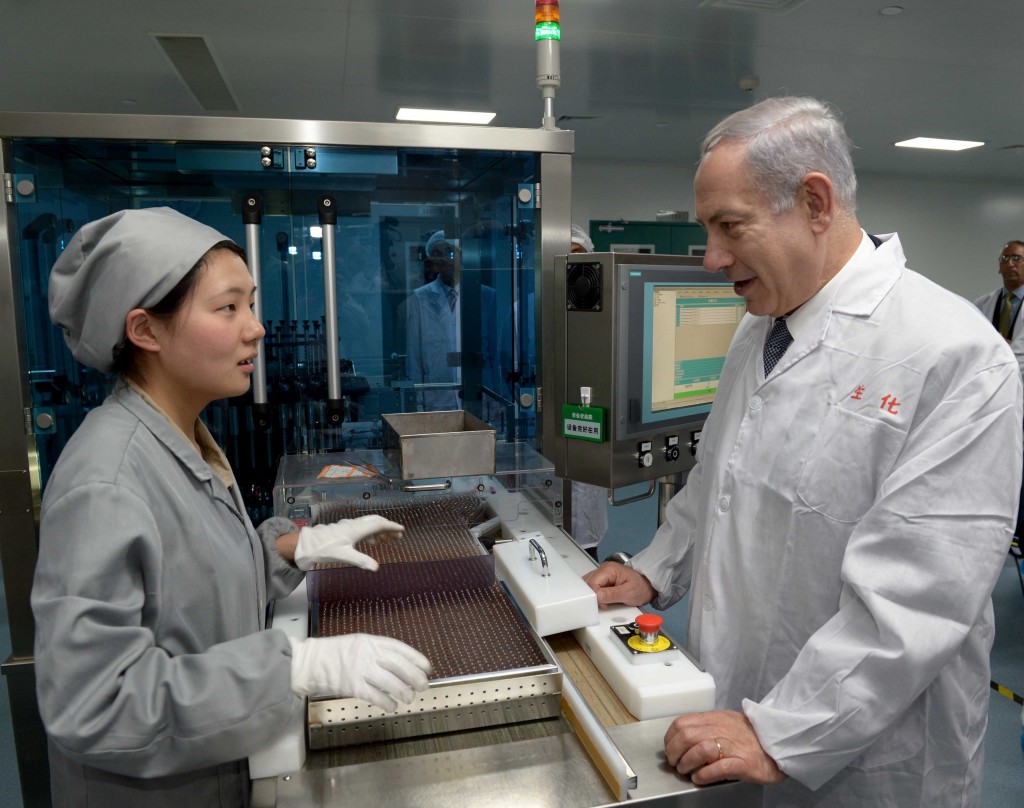
Israeli Prime Minister Benjamin Netanyahu visits a pharmaceutical factory in Shanghai, May 7, 2013. Photo: Avi Ohayon / GPO / Flash90
That’s where Israel, the “Start-Up Nation,” comes in. Israel is a global player in all four areas. Accordingly, the Chinese are paying close attention to the Jewish state. Needless to say, the Israelis are pleased with this, and happy to have access to China’s enormous market. In recent years, economic relations between Israel and China have begun to blossom, and the figures are impressive. As Ohad Cohen, the chief of the Israeli Economy Ministry’s Foreign Trade Administration, noted in a Times of Israel op-ed earlier this year, “Bilateral trade with China has skyrocketed…with volume leaping from $50 million in 1992 to almost $11 billion in 2013. The stage is set for even greater growth in the coming years.”
From Israel’s perspective, strengthened economic relations with China couldn’t come at a better time. The U.S. and European economies are still recovering from the 2008 crisis and growing at anemic rates. At the same time, Europe’s relationship with the Jewish state is becoming increasingly colored by anti-Israel sentiments. In this context, an Asian pivot makes sense.
But it’s important to remember that Israel’s desire to link up with the Far East isn’t new. In fact, it goes back to Israel’s first Prime Minister, David Ben-Gurion.
Ben-Gurion articulated his views regarding the importance of Israel’s relationship with Asia in a 1953 essay devoted to Israel’s international relations, “Israel Among the Nations.” In this essay, the Prime Minster presciently noted “the waning hegemony of Europe and the rise of Asia.”
While acknowledging that, for the foreseeable future, the United States and Russia would struggle over world leadership, Ben-Gurion turned the public’s attention to the rising powers of the Far East. “Once again,” he wrote, “two great and ancient nations—India and China—stride out into independence. Their weight in the scales of humanity is increasing and is likely to tip those scales more yet hereafter.”
But Ben-Gurion didn’t just look at Asia in the context of realpolitik. He also examined Asia’s development in the context of Jewish history. First, Ben-Gurion emphasized that Israel’s historical homeland “stands upon the western edge of Asia.” While the Jewish people were compelled to wander the earth—and to move West—during its exile, “After 2000 years of wandering and dispersion, it is returning to its ancient Homeland in Western Asia.” Moreover, “This marvel is being staged just when the limelight is wavering from Europe to Asia.”
While Ben-Gurion’s evaluation of the rise of China and India was based on their recently achieved political independence and large populations, he also attached great importance to the power of culture. “Not only by reason of their political and numerical importance,” he wrote, “but because of their intrinsic quality and the spiritual links that are being forged in modern Asia, [China and India] are pregnant with a destiny no less great and fruitful than Europe once knew.”
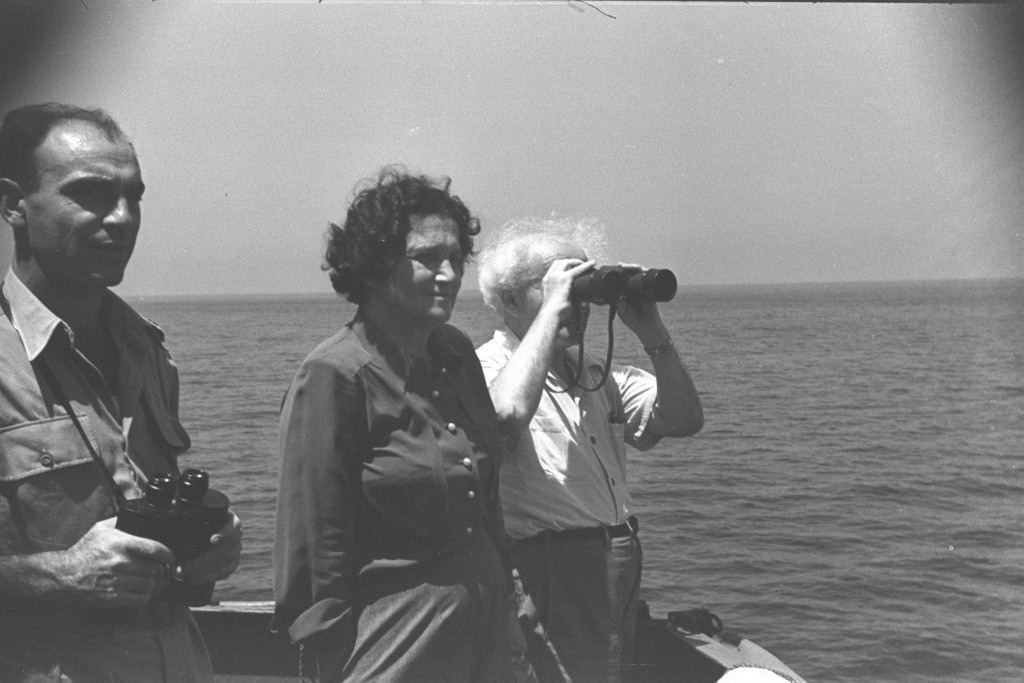
Israeli Prime Minister David Ben-Gurion and his wife Paula take a cruise on the Mediterranean Sea, July 1949. Photo: Government Press Office / Wikimedia
Did Ben-Gurion aspire to recast Israel as an Asian country? Not exactly. He cautioned that the Jewish people “must not and have no right to cast aside their European inheritance of science and technology.” But that said, “Less than all other peoples may the people of Israel shut its eyes to the rise of Asia. … It has been enjoined upon the Jewish people, now settling again in its ancient Homeland, to know all the intellectual and cultural treasures of the people of Asia.” Israel, situated at the Western edge of Asia, straddles the line dividing East from West, and its destiny, according to Ben-Gurion, would be to embrace the best of both.
Today we know that Ben-Gurion was right about the larger historical forces at work. China (and to a lesser extent India) now plays a critical role in the international economy, and is challenging the United States for political hegemony in Asia. In the short term, however, thanks to the leadership of Chairman Mao, communist China developed in a way that made realizing Ben-Gurion’s vision practically impossible. While Israel was the first Middle Eastern country to extend diplomatic recognition to Mao’s China in 1950, formal diplomatic relations were not established until 1992. In the meantime, China championed the Arab cause in the Middle East. At the 1956 Bandung conference, it aligned itself with the Muslim world’s 56 UN votes. As a result, Israeli leaders after Ben-Gurion saw no practical reason to further relations with Beijing.
So how did Israel’s relationship with China develop into what it is today?
The door to China opened when Deng Xiaoping became the country’s leader in 1978. Deng steered China away from Mao’s ideological excesses in favor of market reforms and foreign investment. One of the first to take advantage of this new state of affairs was the Israel-based business tycoon Shaul Eisenberg. There is no history of anti-Semitism in China; in fact, during World War II, 20,000 Jewish refugees, Eisenberg among them, settled in Shanghai. In 1979, Eisenberg arranged for the leaders of Israel’s defense industry to hold a secret meeting with their Chinese counterparts. That meeting led to a number of lucrative arms deals. Thanks to a shared American-Chinese interest in thwarting Soviet ambitions, the United States quietly supported Israel-Chinese cooperation. However, the Chinese did not want to aggravate their traditional Arab allies. As a result, the relationship between Israel and China developed slowly and largely flew under the radar.
Sino-Israeli relations began to deepen amid the decline of the Soviet Union in the late 1980s. In 1991, with the Arab states’ Soviet sponsor out of the picture, U.S. President George H.W. Bush convened the Madrid Peace Conference between Israel and much of the Arab world, including the PLO. Once the Arabs publicly sat down with the Israelis, there was no reason for China not to do the same, and the two countries formally established diplomatic relations the following year. Relations warmed quickly as Israel instituted a series of economic reforms in the 1990s that allowed bilateral trade to increase, leading to Chinese president Jiang Zemin visiting Israel in 2000.
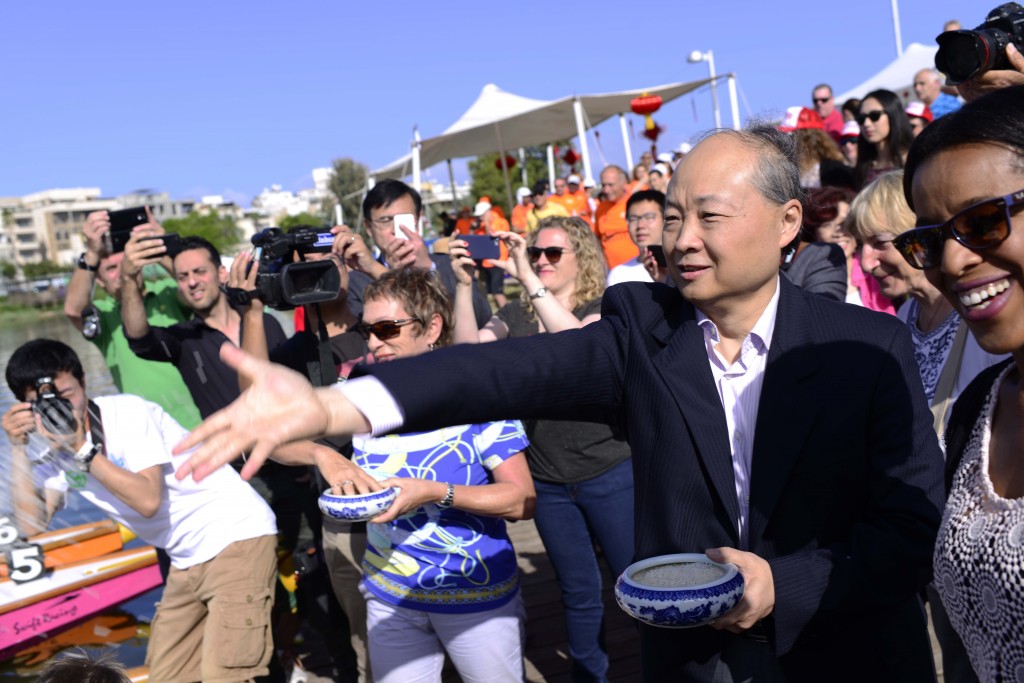
Chinese Ambassador to Israel Zhan Yongxin attends the Dragon Boats Carnival held in Yarkon Park in Tel Aviv, May 1, 2015. Photo: Tomer Neuberg / Flash90
But the end of the Cold War also presented a new challenge to the Sino-Israeli relationship. The defeat of the Soviet Union meant that the U.S. no longer had an interest in allowing Israel to pass advanced technology to China. Some in the Pentagon began to view Beijing as a strategic threat. This recalibration in Sino-American strategic relations manifested itself in the Third Taiwan Strait Crisis in 1996, when President Bill Clinton forced China to stand down by dispatching the largest American military force to Asia since the Vietnam War.
It was in this new strategic context that, in 2000, the U.S. forced the Israeli government to cancel a $1 billion deal to sell China four Phalcon airborne early warning and surveillance systems.
How did China react to the cancellation of the Phalcon deal? Some Israelis feared that relations between the two countries would suffer. But the Chinese government is very pragmatic, and keeps an eminently rational eye on advancing their interests. Although they were angered by Israel’s conduct, they also understood the context. Diplomatic relations cooled for a time, but economic relations continued to heat up. Moreover, Israeli high-tech came into its own at the beginning of the 21st century, and from 2000-2005 trade between the two countries tripled.
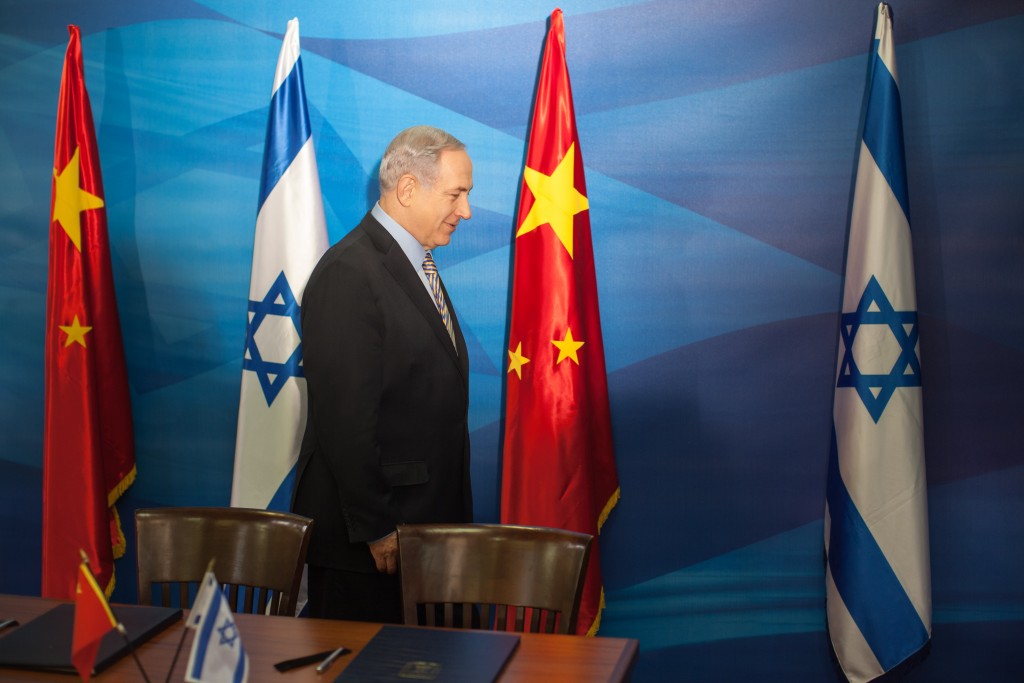
Israeli Prime Minister Benjamin Netanyahu arrives for a meeting with Chinese Vice Premier Liu Yandong in Jerusalem, May 19, 2014. Photo: Emil Salman / Flash90
The decisive economic shift occurred after the Western economies crashed in 2008 and China, in 2010, officially announced its intention to make innovation the new engine of its economy. Partly as a result, leading figures in Israel’s political and business spheres concluded that the time had come to reorient their country’s economic future. As then-Economy Minister Naftali Bennett told Reuters in February 2015, “Israel has made a strategic decision to diversify its commerce, so we’re moving to the East. I’m talking about China, Japan, India … and it’s working.” The results came relatively quickly. Israel has reached out to China, and Chinese companies began investing in Israeli companies and infrastructure. It appears that the Israel-China relationship has now moved into a new phase.
This relationship extends beyond economic cooperation. In 2012, Carice Witte, the founder and executive director of SIGNAL (Sino-Israel Global Network & Academic Leadership), an institute devoted to strengthening ties between the two countries, noted “A Quiet Transformation in China’s Approach to Israel” in a monograph for the Jerusalem Center for Public Affairs. This transformation included, for the first time, significant academic collaboration between the two countries.
Three examples illustrate this change. In September, 2011, SIGNAL hosted the first-ever China-Israel Strategy and Security Symposium at the Interdisciplinary Center in Herzliya. In 2011-12, SIGNAL established five Israel Studies programs at Chinese universities (11 such programs exist today). And in 2013, the Technion – Israel Institute of Technology announced that it will launch a campus at Shantou University in Guangdong, China’s most populous province. Of course, none of these changes would have been possible if China’s leadership hadn’t approved of the shift.
In 2011, Israel’s Council for Higher Education began setting aside hundreds of scholarships for Chinese undergraduate, graduate, and postgraduate students in hopes that more Chinese will study in Israel. Many of these students are studying science and technology, so they spend the bulk of their time in labs or in front of a computer screen. In order to expose them to Israeli society, the first-ever Israel Studies program for Chinese students in Israel was hosted at Ben-Gurion University’s Sde Boker campus in the Spring of 2015. (Full disclosure: I am the program’s academic director).
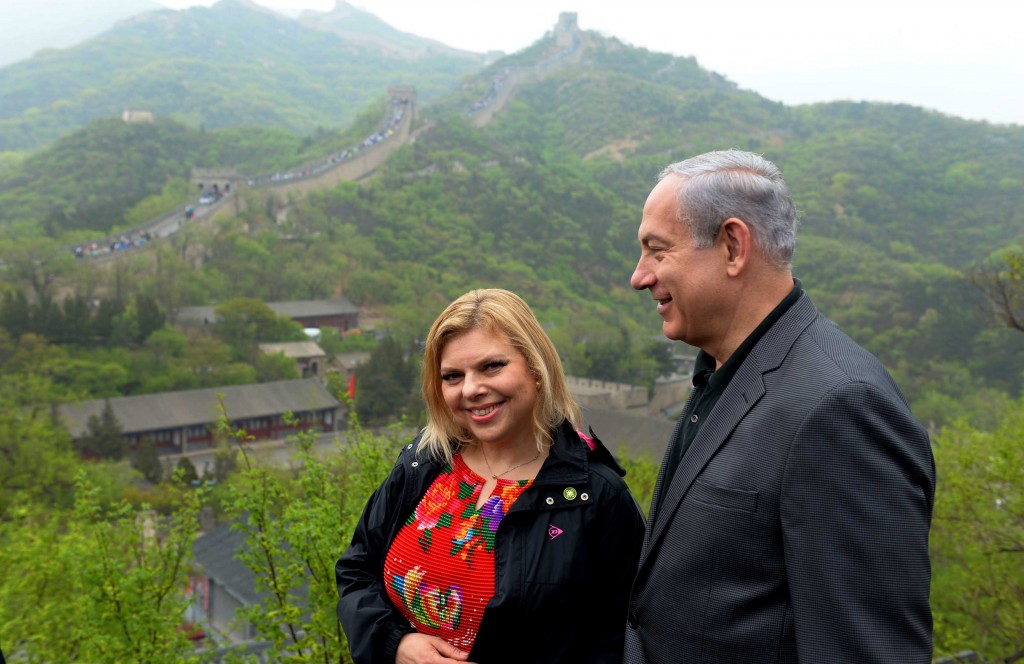
Israeli Prime Minister Benjamin Netanyahu and his wife Sara walk along the Great Wall of China in Beijing, May 9, 2013. Photo: Avi Ohayon / GPO / Flash90
A small number of Chinese students in Israel also enroll in Middle East Studies. After being blindsided by the Arab Spring—and losing a lot of money in the process—the Chinese began to appreciate that Israel is a stable regime with extensive knowledge of a turbulent and very important region. While it is very much in Israel’s interest to increase the number of Chinese students learning about the Middle East from an Israeli perspective, it remains to be seen if a conscious decision will be made to increase the number of Israeli scholarships for Chinese students of the Middle East.
What does the future of Sino-Israeli relations look like?
Academic cooperation will continue to grow, with Chinese students studying in Israel, Israel Studies programs developing in China, and Israeli and Chinese universities expanding their collaboration.
In the economic sphere, much of the future economic collaboration will occur in the context of an ambitious initiative called the “New Silk Road.” The plan, also called “One Belt, One Road,” is to build an infrastructure for land and maritime routes across Asia, Africa, Europe, and their adjacent seas. As the Chinese government explained in March 2015, the “New Silk Road” will “change the world political and economic landscape through development of countries along the routes, most of which are eager for fresh growth.” On the strategic level, the plan will translate China’s economic rise into peaceful geopolitical power while creating the conditions for further expansion of the Chinese economy.
One of the countries on the maritime routes is Israel. It is no surprise, then, that the China Harbor Engineering Company is building a new port in the southern Israeli city of Ashdod. The idea is to integrate the port into the “New Silk Road” by unloading goods at the Red Sea port of Eilat, taking them by train to the Mediterranean port of Ashdod, and then sending them on to Europe. A Chinese company is bidding for the contract to build the Eilat-Ashdod railroad.
Another Chinese initiative, the Asian Infrastructure Investment Bank, is part of the same overall strategy. China’s heavy investment in infrastructure is intended to increase the country’s economic strength and its international appeal. Israel has signed on to be one of the 51 founding members of the bank.
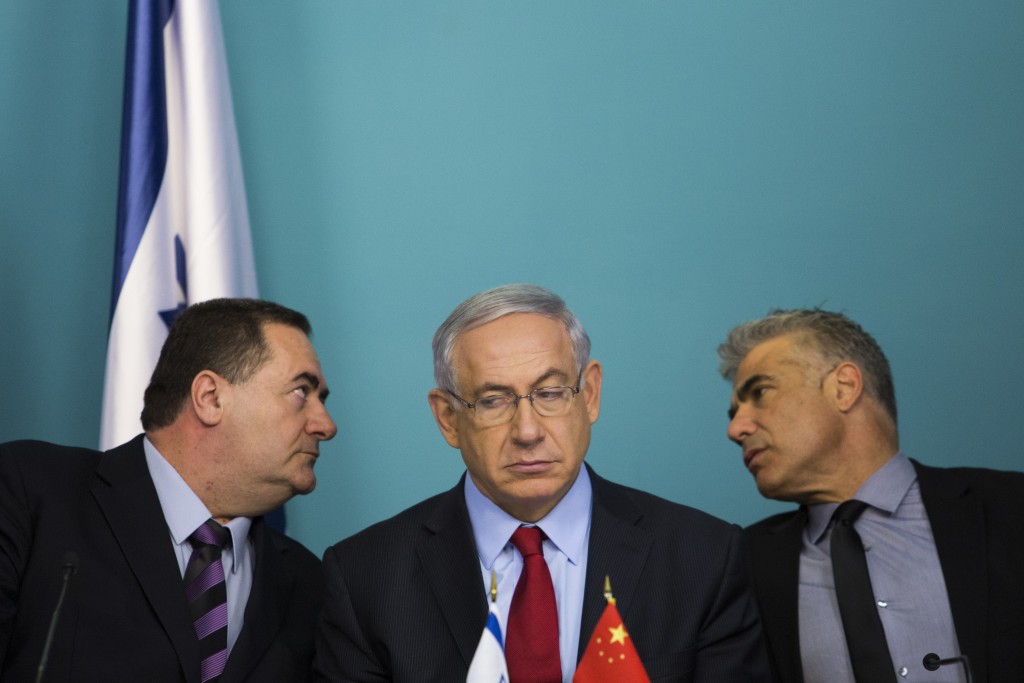
From left: Israeli Minister of Transportation Yisrael Katz, Prime Minister Benjamin Netanyahu, and Minister of Finance Yair Lapid attend a signing ceremony at the Prime Minister’s office in Jerusalem along with Chinese Ambassador to Israel Gao Yanping and Ashdod mayor Yechiel Lasri (both not seen) on September 23, 2014. After three months of negotiations, Israel and the China Harbor Engineering Company have reached terms for the Beijing firm to begin construction on a private port in Ashdod. Photo: Noam Revkin Fenton/Flash90
But aside from working together on these projects, bilateral economic relations between China and Israel are poised to expand rapidly. The two countries are expected to sign a free trade agreement in the next few years, and Israel hopes to increase Chinese tourism (already up 30 percent this year) through direct flights between Beijing and Tel Aviv—expected to be announced by the end of the year—and cancelling visa requirements.
On the diplomatic front, China and Israel continue to strengthen ties through regular high-level visits. Prime Minister Benjamin Netanyahu traveled to Beijing in 2013, and Shimon Peres made a presidential visit in 2014. China’s military chief of staff visited Israel in 2011, the Minister of Foreign Affairs arrived in 2013, and the Vice Premier touched down in 2014. These visits are not mere formalities. As Alexander B. Pevzner, founding director of the Chinese Media Center in Rishon Lezion, wrote in The Jerusalem Post, “The visits are an integral part of thoughtful Chinese diplomacy and signify a willingness on the highest level to further boost ties.”
This quiet transformation in Israel’s relationship with China means that the time is finally right for the realization of Ben-Gurion’s original call “to know all the intellectual and cultural treasures of the people of Asia.” Such knowledge, including the three main streams of the Chinese “way”—Confucianism, Taoism, and Buddhism—will enable Israelis to better understand the Far East.
Ben-Gurion, it should be noted, didn’t just talk the talk. In 1961, while serving as Prime Minister, he set off on a 16-day visit to Burma (today called Myanmar). He meditated with Burma’s premier, U Nu, and spent eight days in a private retreat studying Buddhism. Visitors to Ben-Gurion’s modest homes in Tel Aviv and Sde Boker can see for themselves the impressive collection of Asian texts that line his carefully preserved bookshelves. He even penned an essay on Buddhism for The New York Times Magazine in 1962, titled “Ben-Gurion Examines the Buddhist Faith.”
So how can Israel follow in Ben-Gurion’s footsteps? What can Israel learn from China today? First, it is important to understand that, in some fundamental ways, the Israelis and the Chinese resemble no one so much as each other. At first glance, Israel and China appear so different that the similarities almost always go undetected; but they exist.
First, both the Jews and the Chinese are ancient nations whose histories go back more than 3,000 years. Yet toward the end of the 19th century, both of them found themselves impoverished and politically powerless, with their ancient traditions in crisis.
Threatened by the power, both hard and soft, of Western civilization, both peoples produced revolutionary leaders who directly attacked their own traditions in order to fashion a “new man” capable of shaping their national future. For example, the young Mao Zedong argued that, “Our nation’s two thousand years of scholarship may be said to be unthinking learning,” an idea that revolutionary Zionists would have immediately and viscerally understood. And like the Zionists’ call for a “muscular Judaism,” Mao advocated yundong (“movement” or “activity”) and the strengthening of the body.
Modern Israel was reborn as a socialist country in 1948, and modern China was reborn as a communist state in 1949. As part of the process of nation-building, both countries closed themselves off from what they perceived to be pernicious outside influences. In Israel, for example, the Beatles were forbidden from performing lest they “corrupt the youth.” Israel opened up to the world at the end of the 1960s, while China did so a decade later after the frenzies of the Cultural Revolution. Both countries then remade themselves in order to link up with the global economic system.
Today, the societies of both Israel and China are engaged in a process of re-embracing the past that their revolutionaries attacked. In China, for instance, a statue of Confucius was, for a time, set up in Tiananmen Square. The truth is, the revolutionaries always had limited cultural impact. In Israel, they failed to uproot the traditions of Asian and North African Jews; while Mao admitted to President Nixon that, when it came to Chinese culture, “I haven’t been able to change it. I’ve only been able to change a few places in the vicinity of Beijing.”
Israel and China are thus uniquely positioned to understand each other. Both ancient nations experienced and withstood attacks from within against their ancient traditions in the name of a new national future. And they are now trying to balance the duties imposed by traditional values with those of a modern state deeply involved in the global marketplace.
Looking to the future, extended exposure to Chinese society can help Israel understand some of the excesses it has absorbed from the West. China still revolves around the Confucian values of family, hierarchy, and respect for the past. Although these values also characterize Israeli communities from Asia and North Africa, they challenge the prevailing norms in certain elite circles of Israeli society. Can hyper-individualism, for example, be considered a Jewish value? Can freedom interpreted as emancipation from even minimal obligations to family, community, and one’s national past be considered Jewish values? Moreover, learning Chinese values can help Israelis moderate their chutzpah, something that, in day to day life, often becomes a vice.
This cultural exchange need not be a one-way street. As part of Beijing’s quest to become more innovative, the Chinese can learn that challenging one’s superiors can actually strengthen an existing system. After all, Israel’s ancient hero, Abraham, left an example for all time and all nations by arguing with God. Start-Up Nation, a bestseller in China, tells the story of how such chutzpah works in present-day circumstances.
What Ben-Gurion intuited in the 1950s, the great statesman and founder of Singapore, Lee Kuan Yew, saw clearly at the end of the 1990s. “The 21st century,” he said, “will see Asia recover its place in the world.” Israel, standing at the Western edge of Asia, should prepare to take its place in that world. But in order to do so, it should not concentrate exclusively on the economic aspect of the Sino-Israeli relationship. In relating to China, politics, economics, and culture need to be seen as parts of an interconnected whole. Such a holistic approach would, of course, reflect the ancient Chinese way, from traditional Chinese medicine to Sun Tzu’s Art of War to Confucius’ insistence that a true gentleman can never be a specialist. What’s more, its adoption would embody one of Ben-Gurion’s “treasures of the people of Asia.”
![]()
Banner Photo: Israel Defense Forces / flickr






